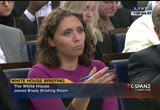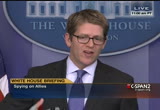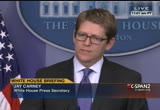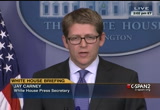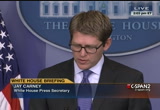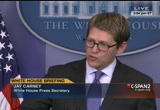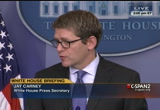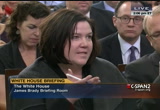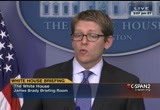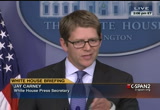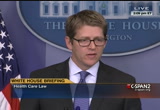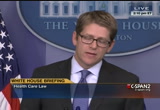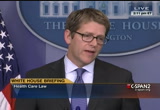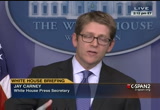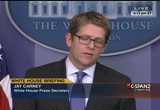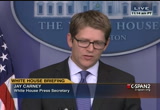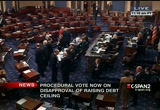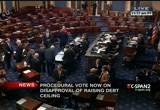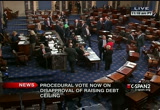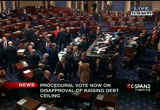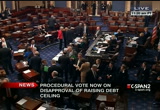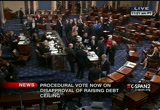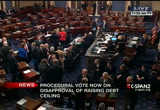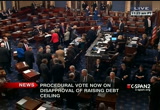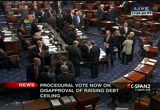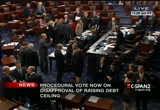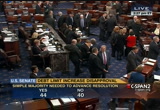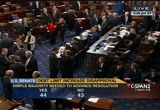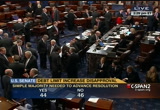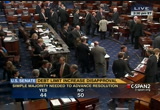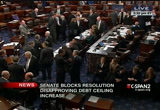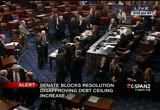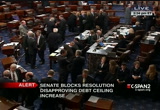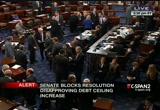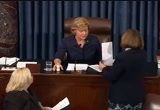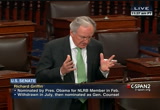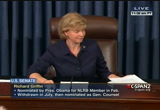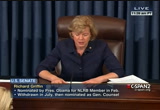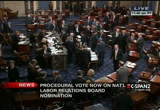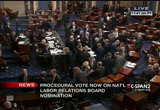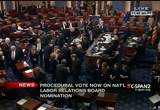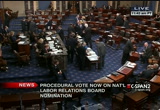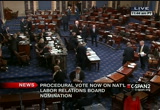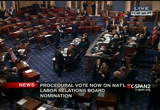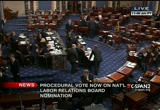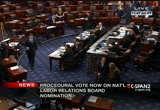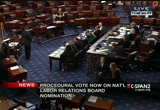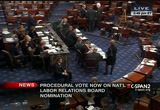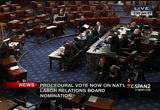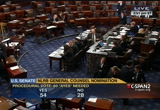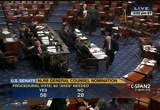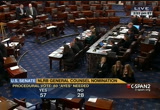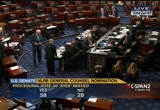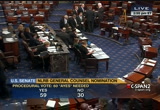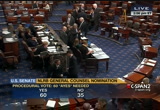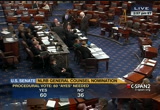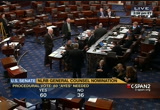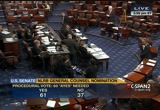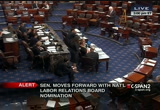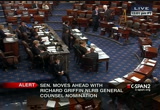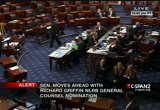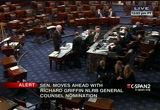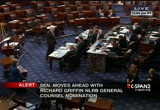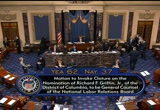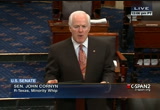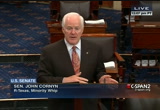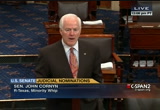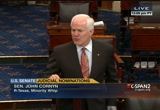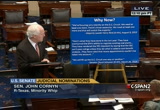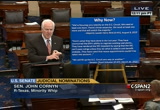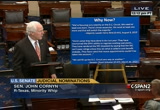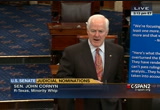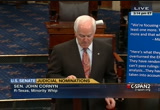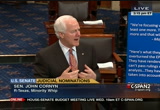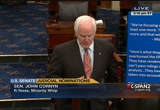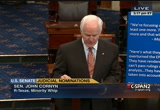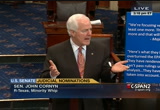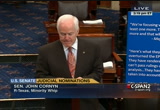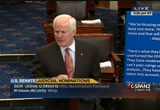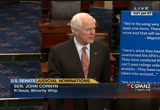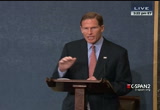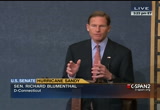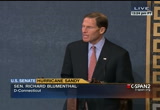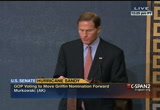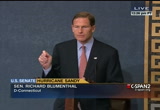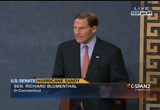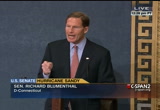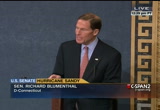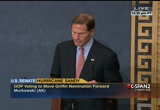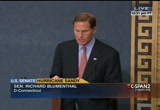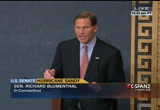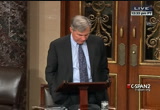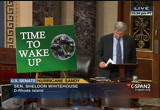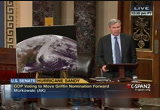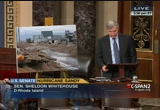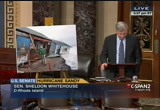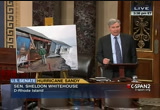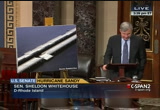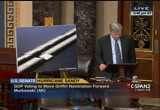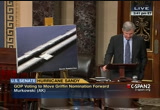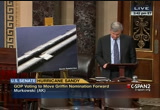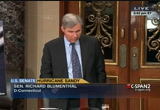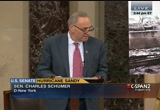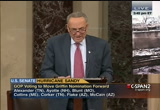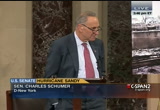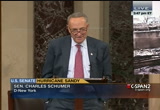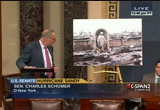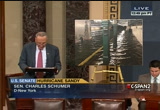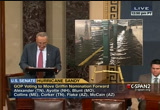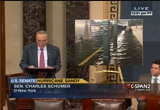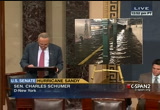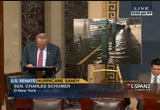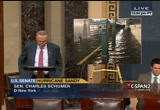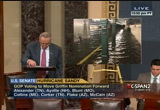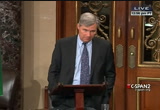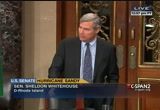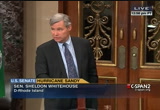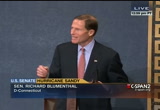tv Key Capitol Hill Hearings CSPAN October 29, 2013 2:00pm-4:01pm EDT
2:00 pm
learn in the coming days or a shorter time frame of the decision on that specific program -- [inaudible] >> i think generally speaking you should expect it upon conclusion of the review. we will endeavor to make public as much information as possible mindful of the fact that these are national security programs and national security operations and intelligence matters that almost by definition demand that not everything be revealed about them. so that's a long way of answering that i think you would expect us to have much more to say at the cop collusion of the review than we can say now. i can tell you that in the course of the review some decisions have been made about our intelligence-gathering activities even as we with proceed with it, and some of those decisions have been made and are being implemented. but we're not going to get boo details about -- into details
2:01 pm
about those issues or all of the activities that are under review until we come to a conclusion about the way we can balance those -- >> if some decisions have been made and you have this uproar overseas and on capitol hill, why not make public some of what you are changing to show people that you are taking action? >> well, we are engaged in direct communications through diplomatic channels with a number of countries on these matters, and a number of countries have, as you know, expressed concerns about the reports, the disclosures that are emanated in the wake of the unauthorized leaking of classified information. so that communication is happening, and it's robust. and as i said yesterday, we understand the concerns that have been raised, and we are working with our friends and
2:02 pm
allies to discuss these matters, to explain what we're doing in terms of the review that we're engaged in and to continue to focus on the cooperative relationships that we have when it comes to intelligence gathering because it's important to remember, as i said yesterday, that, you know, the purpose of this intelligence collection is to enhance the security of the american people and the united states and our allies. and the actions that are taken by the intelligence community and the information that they collect helps the united states protect lives and protect the lives of our allies, the citizens of those countries. so -- and vice versa. we rely enormously on efforts undertaken by our friends and allies, by their intelligence services. we share information, and together we enhance each other's security. having said that, it's important to note, as the president has, that we should go about this
2:03 pm
review of our intelligence-gathering activities mindful of all of our security needs and demands but also of the need for balancing those demands against the sincere privacy concerns that americans and others share. >> i wanted to if i could yield what little was left of my time roger who has to take care -- >> roger, great to see you. >> are thank you so the gentlelady -- [laughter] following up on julie's question, senator feinstein said yesterday that she had been told that the data collection on the allies will not continue. is that one of those decisions that has been made? >> let me say two things. first of all, we consult regularly with chairman feinstein as a part of our ongoing engagement with the congress on national security matters. and we appreciate her continued leadership on these issues as chairman of the senate intelligence committee. when it comes to statements that senator feinstein has made, i would refer you to her about
2:04 pm
them. what we've made clear is that we are undertaking a review of our activities around the world with a special emphasis on examining whether we have the appropriate posture when it comes to heads of state. examining how we coordinate with our closest allies and partners and examining what further guiding principles or constraints might be appropriate for our efforts. so the review encompasses a lot of activity, but there is an emphasis, a special emphasis on those areas. beyond that, it's on -- the review is ongoing, so i'm not going to discuss the details or the outcomes going back to julie's question until it's completed. finish but as i said, we've made some decisions, the president has made some decisions, and i would expect that we'll make more as this process continues. and then when it's over, we'll have more to say about the decisions we've made. >> so you're not ruling out the accuracy of -- >> well, i would just refer you to chairman feinstein about that. >> all right. on another subject of the cyber
2:05 pm
meeting this morning with ceos, did the president give this the chief executives some sort of idea of the draft standards that are supposed to be coming out, and how did they react? >> well, as you know, that meeting ended not long ago, and the meeting focused with ceos from the financial, energy, defense and information technology sectors on cybersecurity. the president was there as well as senior white house and national security council staff. i don't have a full readout yet, roger, but i understand that they discussed the implementation of the president's executive order on improving critical infrastructure, cybersecurity and particularly the preliminary voluntary cybersecurity framework that has been developed by the national institute of standards and technology in partnership with industry. the preliminary framework, which is intended to provide voluntary guidance for industry to encourage companies to adopt sound cybersecurity practices, was released last week and published in the federal
2:06 pm
register today and is open for public comment. the companies that met with the president were among those that worked most closely on the framework, and this meeting is part of the administration's ongoing dialogue with the private sector on cybersecurity which is an issue, as you know, that has received a great deal of attention from the administration because it is of such great importance to our national security and to our broader interests. >> any reaction from -- >> i would refer you to them for their reaction. but the president certainly appreciated the meeting. yes, roberta. >> i'm wondering -- roger, are you good? >> you explain in just very clear and plain terms -- >> yes. >> -- the disconnect between what the president said about if you want to keep your plan you can keep it and what we see people complaining about which is being kicked out of their plan or being told they have to
2:07 pm
buy a more expensive plan, can you -- >> i appreciate the question, and i thank you for the opportunity to explain this. and i understand that there's a lot of tension, of attention being focused on it and that it deserves fuller explanation. and i think fuller explanation by us and fuller explanation by everybody reporting on it so that viewers and readers and listeners are getting the full picture about this issue. so let's step back. if you are one of the 80% of the american people who receive insurance coverage through your employer or through medicaid or medicare or the veterans administration, this conversation doesn't apply to you. these reports do not apply to you. if you're one of the 15% of the american people who are uninsured entirely right now, this conversation does not apply to you. so what we're talking about here is the 5% in the country who
2:08 pm
currently purchase be insurance on the individual -- purchase insurance on the individual market. and that market has been like the wild west. it has been underregulated, it is the place where americans have most keenly felt the challenges posed by the insurance system in in this country where, for example, insurers could deny you coverage if you had a pre-existing condition, or they could offer you coverage that in its fine print excluded benefits specifically related to your pre-existing condition. so if you are, if you have hypertension or you're a cancer survivor, they could carve out coverage on those specific issues and then give you a plan that would cover you on other things. they could also and did routine ly change your plan or eliminate it altogether annually. they could throw you off.
2:09 pm
they could jack up your premiums. they could change your coverage. and one of the issues that the affordable care act was designed to address was the need to provide greater security the those americans who had no other option but to seek insurance on the individual market. so that's the universe we're talking about, 5% of the population. and i think the it's important to know that, because in some of the coverage of this issue in the last several days, you would think that you were talking about p75% or 80% or 60% of the american pomlation. so there's that -- population. so there's that. as the law says and as the president made clear in the statements that you cite, if you had insurance coverage on the individual market when the affordable care act was passed into law and you liked that plan and you wanted to stay on it
2:10 pm
even though it didn't meet the minimum standards that the affordable care act would bring into place on january 1, 2014, you can keep that coverage. you're grandfathered in. that plan and your association with it are grandfathered in citizen in perpetuity. not for a year, not for five years, but forever. but what is not the case is if your insurer basically threw you off that plan by telling you after a year or two that it was changing and said here's your new option because your plan has changed, that that new plan is grandfathered in because how could that be? you can't grandfather in a plan -- >> [inaudible] >> look, it's not about fault. insurers are in the leadup to the creation of these marketplaces were doing what they'd always done. and based on the incentives that existed in the existing insurance market for individuals. the good news is that for every one of these individuals who might have a plan that is almost by definition providing less
2:11 pm
than minimal benefits and that may, as is normally the case, carjack you twice as much if -- charge you twice as much the you're a woman or penalize you because of your age or a pre-existing condition, you now are being offered a variety of options including options by the very insurer that covers you today for new coverage. and be what is also true is that you can look at those options and then go and check what your qualification might be for tax credits, and you might discover as a significant portion of this 5% will discover that you're actually going to pay less come january for better coverage than what you're paying now for far worse coverage. there was a story the other morning that highlighted this phenomenon, the sending of letters, that featured a woman
2:12 pm
in florida who was worried because she could not continue coverage under her existing plan. and as reported, it made it sound like she had a plan and she wanted to keep it, but she couldn't. and the reason for that would be that this is a new plan that had been created since the affordable care act passed or that she dropped coverage and reinstated it, again, after the affordable care act pass ad. but what the report didn't say is that her plan didn't cover her for hospital visits. that her plan is basically one of the most basic kinds of plans available that provide almost no security. and what we stipulate, that the affordable care act as campaigned on by the president, as, you know, the health care reform that he campaigned on and as drafted and passed into law and signed into law by the president and upheld by the supreme court was designed specifically to protect those
2:13 pm
americans who were getting a raw deal in the existing insurance market and protect them by insuring that everybody could get affordable coverage or the universe of people who could get affordable coverage would expand greatly, and that coverage would expand benefits not currently covered in of these plans. so i think i know it's hard to explain all that when you're writing about it, and i know it's hard especiallybe you're doing a tv package on it. you know, two minutes is not a long time. but it is important to remember the context here. it is not -- we're talking about 5%, and we're talking about when you look at what actually happened since the passage of the affordable care act and the clause that allows you to grandfather in, the fact is that millions of americans who have been subject to the whims and vagaries of this individual insurance market are going to have security that they've never had before and better coverage in most cases than they've ever had before and cheaper coverage
2:14 pm
in cases than they've ever had before. >> so people who are unhappy are misinformed with the -- >> look, i think a couple of things. one, every individual story has a story behind it. someone may not have had insurance coverage when the affordable care act passed or maybe they were covered by their employer. maybe last year they lost their job or they changed jobs, and now they don't get employer coverage, and they saw it and purchased a plan on the individual market, and the individual market that provides very few options and little desirable coverage at affordable costs. so what is certainly the case is that come january 1, 2014, plans that don't provide these basic benefits, plans that don't provide ma they werety care, mental health care, other preventive services, plans that place caps on your annual out-of-pocket benefits, all of those can no longer exist
2:15 pm
because the purpose here was to create some minimum benefits for the american people so that they could enjoy the security of health insurance coverage, quality health insurance coverage. but for people who were on a plan when the affordable care act was signed into law and who want to -- >> white house spokesman jay carney. we'll leave it here and return to live coverage of the u.s. senate. is there a sufficient second? there is a sufficient second. the clerk will call the roll. vote:
2:36 pm
2:37 pm
following nomination, which the clerk will report. the clerk: nomination, national labor relations board, richard f. griffin jr. of the district of columbia to be general counsel. the presiding officer: under the previous order, there will be two minutes of debate equally divided in the usual form prior to a vote on the motion to invoke cloture on the nomination. who yields time? the senator from iowa. mr. harkin: madam president, we're getting ready to vote to end debate. this is the cloture vote on richard griffin to serve as general counsel of the national labor relations board. as i stated yesterday, this is an important role for making sure the nlrb can do its job. the presiding officer: the senate will be in order.
2:38 pm
senators please take their conversations out of 9 well. of -- out of the well. the senator from iowa. mr. harkin: thank you, madam president. this such, as you know, we voted to -- this summer, as you know, we voted to fill the board with the requisite number of republicans and democrats on the board. i thought that was a good vote. this is the one left over, that's the general counsel position. mr. griffin is very well qualified, he's been thoroughly vetted. i have seeftd absolutely not o one -- received absolutely not one objection to his qualifications or his background. he's had 30 years experience as a lawyer, a labor lawyer, and he deserves strong bipartisan support. i urge my colleagues to vote cloture so we can get to the vote later today. mr. alexander: madam president? the presiding officer: the senator from tennessee. mr. alexander: madam president, i am not going to vote to confirm mr. griffin because i think his membership on the board doesn't do anything to keep it from moving toward advocacy instead of being an
2:39 pm
umpire. but i do think it's time to close the debate and have an up-and-down vote so i'm going to vote "yes" on cloture. the presiding officer: under the previous order, the clerk will report the motion to invoke cloture. the clerk: cloture motion. we, the undersigned senators, in accordance with the provisions of rule 22 of the standing rules of the senate, hereby move to bring to a close the debate on the no nomination of richard f. griffin jr. of the district of columbia, to be general counsel of the national labor relations board. signed by 18 senators. the presiding officer: by unanimous consent, the mandatory quorum call has been waived. the question is: is it the sense of the senate that the debate on richard f. griffi griffin jr. oe district of columbia to be general counsel of the national labor relations board, shall be brought to a close? the yeas and nays are mandatory under the rule. the clerk will call the roll.
3:05 pm
the presiding officer: are there any senators wishing to vote or change their vote? if not, on this vote the yeas are 62, the nays are 37. three-fifths of the senators duly chosen and sworn having voted in the affirmative, the motion is agreed to. pursuant to senate resolution 15 of the 113th congress there will now be eight hours of debate on the nomination equally divided in the usual form.
3:06 pm
the republican whip. mr. cornyn: mr. president, the aftermath of the battles over the continuing resolution and the debt ceiling, i'm sure i'm not alone in hearing from my constituents who were hoping that democrats and republicans can work together on some of the most important and chronic problems that challenge our country. instead of taking that advice or taking that opportunity, my friends across the aisle have taken this opportunity to engage in what can only be described as a power grab that will result in even more polarization and partisan acrimony here in washington. what i'm talking about specifically is the presidents and -- the president's and the democratic leadership's effort to pack the district of columbia
3:07 pm
court of appeals. for those who may not follow the federal court system, america has 13 different federal appellate courts but the d.c. court stands out as the most powerful in the country. some have called at this time second most important court in the nation because it has jurisdiction over a variety of regulatory and constitutional matters whether they be -- relate to dodd-frank and financial services, whether they relate to obamacare and its implementation or whether they relate to national security matters. all of those types of cases get heard in the d.c. circuit court. no other appellate court in the nation wields such fast through over hot-button issues ranging as i said from health care to environmental issues, the environmental protection agency and its activities which i know are important to the presiding officer as they are to me as well as gun rights and the war
3:08 pm
on terrorism. now, president obama argues that the d.c. circuit court needs three more judges in order to get its work done. but the facts simply don't bear that out. that's not true. for example, between 2005 and 2013, the d.c. circuit's total number of written decisions per active judge actually went down by 27%, the number of appeals filed with the court fell by 18%. so instead of having more work to do, it has less work to do than it did in 2005. as one commentator has observed, the d.c. circuit already has the lowest caseload in the nation and if anything, trends show that their workload is decreasing. decreasing, going down, not
3:09 pm
up. indeed, one d.c. circuit court judge recently told the senior senator from iowa if any more judges were added now, there wouldn't be enough work to go around. well, you might be wondering then why the president and why senator reid want to pack the d.c. circuit court with three additional judges if there's not enough work to go around today. well, i would just note, mr. president, that the d.c. circuit court also has a unique record in that it actually took four months off between may and september of this year, hardly the record of a court that has too much work to do and simply can't get it done. meanwhile, there are courts across our country, both appellate courts and district courts, that are overburdened, some of which are labeled as a
3:10 pm
judicial emergency. they simply have such a heavy caseload they can't get it done. why wouldn't we want to allocate more judicial resources, more help, to those courts that need the help rather than to pack the d.c. circuit court with judges that simply -- it simply doesn't need? well, don't just take my word for it. prominent democratic leaders have actually made no secret of what's happening here because you would wondware the rationale is if there's not enough work to do, why is senator reid and other democratic leaders, why would they want to add judges to a court that doesn't have enough work to do? back in march the senior senator from new york, senator schumer said of the d.c. circuit judges, the second half here, he said here's what they have done in the last year: they have overturned the e.p.a.'s ability to regulate existing coal plants, they've rendered the
3:11 pm
s.e.c., securities and exchange commission, impotent by saying that the s.e.c. can't pass rulings unless they do what is called a cost/benefit analysis, and they've ruled that recess appointments couldn't be taken into account. here's what senator schumer said, we will fill up the d.c. circuit one way or another. well, i disagree with senator schumer's characterization on some of these cases but it is true that the d.c. circuit court has a unique role in american jurisprudence in deciding some very important cases for the entire country. because the administrative agencies that are part of the executive branch when they make decisions whether it's financial services, the environmental protection agency, whether it's health and human services, whether it's any administrative agency, those decisions typically get decided and reviewed by the d.c. circuit court of appeals. more recently, the majority
3:12 pm
leader put it this way: this is the top scwoat, we're focusing very intently on the d.c. circuit. we need at least one more. there's three vacancies. we need at least one more and that will switch the majority. so this isn't about the efficient administration of justice, impartial justice. this is about stacking the court by changing the majority. that's the majority leader of the united states senate who said that. so there's no mystery about what's going on here. the majority leader and his allies are attempting to pack the court with judges who will rubber stamp their big-government agenda. and he's also threatening to use the nuclear option again unless senate republicans simply snap to attention and salute smartly. well, it's not going to happen.
3:13 pm
in simple terms, democrats are prepared to violate the senate's own rules to help flip the d.c. circuit in favor of the obama administration's aggressive administrative overreach. if these tactics succeed, the senate will be weakened as a institution and the nation's second highest court will be transformed into a far-left ideological body. but i would also remind my colleagues what goes around comes around in the united states senate. when republicans control the senate and we have a republican in the white house, i would warn my colleagues that the same rules that they put into effect with the nuclear option will be used to their disadvantage then and we shouldn't do it. we shouldn't go there. but it's clear what the motivation is. again, this is not about the efficient administration of justice, impartial justice. this is about getting your way
3:14 pm
and getting a rubber stamp on the actions of regulatory overreach that are far too common here in washington, d.c. well, it is true that the d.c. circuit court has ruled against the obama administration's regulatory agencies, but it's also true that they've affirmed many of the most important and far-reaching decisions of the obama administration's regulatory agencies. one example where it ruled against the administration is in 2011 when it struck down the securities and exchange commission proxy access rule by declaring that the agency failed to conduct a cost/benefit analysis required by law before adopting the regulation. i don't know about you, but i wish the government would do more cost benefit analyses, not less, and i'm glad the d.c.
3:15 pm
circuit court struck down the failure of the securities and exchange commission, the failure to conduct a cost/benefit analysis which they did. in another example last year the court vacated the environmental protection agency cross state air pollution rule noting it would have massive emission reduction requirements on certain states without regard to the limit set by the statutory text. in other words, they acted beyond their congressional authorization. this was also an example in texas. texas got swept into this cross-state air pollution rule without even an opportunity to be heard and to offer competing analysis of the models that the environmental protection agency used. so no matter how committed we all are to clean air, we shouldn't sanction an
3:16 pm
administrative run amok doing things that aren't authorized by the statutory text. well, the d.c. circuit has also rejected an unconstitutional pair of appointments by the president made to the national labor relations board. talk about overreach, this is where the president tried to trump the confirmation powers of the united states senate in the constitution, the power of advise and consent which it's call by making so-called recess appointments. and the d.c. circuit called him on it and held it was unconstitutional. more recently the court held that the president's nuclear regulatory commission was simply flouting the law. don't we want a court to call the president when administrative agencies are simply flouting the law?
3:17 pm
if we are a nation of laws. in this case they flouted the law by delaying a decision on whether to use the yucca mountain nuclear waste repository. these were all commonsense decisions, and you can probably tell from my comments that i think they were well grounded in the law and the facts, and i agree with the decision. in that case they all went against the obama administration's preferred position. but it's true the d.c. circuit has also ruled in favor of the administration's position in a number of cases. again, here's an e.p.a. decision since 2012 jeremy jacobs reports that the agency has won 60% of the cases that have been reviewed by the d.c. circuit court of appeals. 60% of the lawsuits where the environmental protection agency has been taken to court for exceeding its authority.
3:18 pm
60% of the time the e.p.a. position has prevailed. that's a better performance than the e.p.a. had at the circuit during george w. bush's administration. in particular, the e.p.a. has scored landmark victories on cases relating to greenhouse gas regulations, ethanol-blended gasoline, and mountaintop removal coal mining. but beyond energy and environmental issues, the d.c. circuit court has upheld president obama's executive order regarding embryonic stem cell research on two separate occasions, in 2011 and 2012. again, these aren't my preferred outcomes, but i think it demonstrates that the d.c. circuit court has learned to strike a balance and certainly is not pro-administration or anti-administration. it epitomizes what a court should be, which is an impartial administrator of justice.
3:19 pm
again, this same court upheld the affordable care act in 2011, ruling that the individual health insurance mandate was constitutional under the commerce clause. we know what happened when it got to the united states supreme court. they had a different view. but it demonstrates the kind of judicial restraint that the current d.c. court, balanced as it is, with four nominees by a republican president and four nominees by a democratic president, how it is administered evenhanded justice which would be destroyed if the president is successful and senator reid is successful in packing this court with three more of its liberal allies. well, as i say, this court is currently split right down the middle. four of the active judges are appointed by a republican president. four were appointed by a democratic president. and yet, it's clear that the
3:20 pm
d.c. circuit court is in the cross hairs of the majority leader and his democratic allies, including the president, because they want to tilt the court in their direction, a more liberal, a bigger government direction, one that's more deferential to administrative agencies like the environmental protection agency and other agencies that refuse to take into account a cost-benefit analysis, which we ought to have more of, not less. well, the truth is there is an answer to this standoff in terms of the court packing that president obama hand senator reid are attempting here. there actually is a way to reallocate these unneeded seats from the d.c. circuit court of appeals to other courts that actually need the judges, unlike this court that has the lightest caseload of any circuit court in the nation. senator grassley, the senior
3:21 pm
senator from iowa, has offered a reasonable compromise which would allow several of president obama's appellate nominees to be approved tor district courts -- approved for district courts or court of appeals where they're actually needed. in other words, president obama would still get to pick them. he would have to pick them for courts where they have enough tworbg -- enough work to do. based on current workloads the d.c. circuit court does not need new judges but other appellate courts really do. i would think during a time when budgets are constrained after the budget control act, when discretionary spending is down, when the courts need more resources allocated, that we would want to allocate the resources to courts and to jurisdictions where they're actually needed, not to places where they're not needed. for all these reasons and more, i hope that members of both parties will agree that the
3:22 pm
reasonable things to do would be to pass the grassley bill, the grassley compromise, to reallocate these judges to the places where they're really needed and to prevent the stacking of this court and this reckless power grab. mr. president, i yield the floor. mr. blumenthal: mr. president? the presiding officer: the senator from connecticut. mr. blumenthal: thank you, mr. president. i rise today in recognition of the one-year anniversary of superstorm sandy's landfall on the northeast and the destruction that it brought to a ruinous path through connecticut, new york, new jersey, and rhode island. and i will be joined today on the floor and ask unanimous consent that we be permitted to engage in a colloquy by my
3:23 pm
colleagues from new york, senator schumer; and from rhode island, senator whitehouse, if there is no objection. the presiding officer: without objection. mr. blumenthal: thank you, mr. president. i can scarcely capture in words the awesome, monstrous power of this storm as it hit the northeast. and as i traveled through it, i was near the coastline of connecticut, traveling some of the roads in the midst of this storm as it ripped through my state, tearing apart communities along our coast, destroying homes and businesses, displacing families, forever altering the shoreline itself. and anybody who questions the power of nature at its most destructive should have seen this storm as it unfolded and the damage that it left in its
3:24 pm
wake. in fact, in connecticut, $770 million in damages. what i remember from touring connecticut is not only the size and magnitude of destruction, but also the resilience and strength of connecticut's people as they struggled through the pain and anguish of coping with this devastation, wondering how they would ever rebuild. and, in fact, they have rebuilt with that courage and relentless strength and fortitude that has so marked the character of connecticut and new england and new york as they rallied around one another and exhibited that sense of optimism and hope which was as important as any material resources that were brought to bear. they rallied around each other with gratitude and with hope
3:25 pm
because they had each other and they have succeeded in clearing the debris, reconstructing, rebuilding in a way that is inspiring. i only wish that congress's response was as effective and courageous as the citizens of connecticut that i viewed in the storm's aftermath. the senate was slow to act, but it was before the house in passing the $60 billion recovery package for the northeast. and the effort was stalled in the house, quite bluntly, by partisan politics of the worst kind and trivial obstruction. and there are lessons to be learned here. number one, that partisanship and politics should have no role in our response to disasters,
3:26 pm
whether in oklahoma or colorado or louisiana or the northeast. we are all in this effort together when disaster strikes. we should rally around each other as the people of connecticut rally. and our response has to be quicker, smarter, stronger than it was in this instance. we owe it, again, to ourselves as well as to people who have suffered financial and emotional loss. and many of them physical injury as a result of this kind of natural disaster. those two lessons are reenforced by a third, which is these superstorms have become the new normal. we can no longer regard the one in a century storm as one every hundred years.
3:27 pm
they are coming once every year because climate disruption is in fact increasing, their frequency and force in a way that is awesome and alarming and astonishing. and so, another lesson here is that there has to be preparation to prevent damage, to mitigate the effects of these storms when they strike. and the investments -- and they are investments -- have to be smart and strong in means such as storm barriers, breakers, better shoreline resilience. eventually the federal government provided aid, and connecticut has put it to good use. the $200 million distributed through the national flood insurance plan to homeowners and business owners, cities and towns around my state have used
3:28 pm
$42 million in fema assistance and more than $10 million have gone to health services and facilities. and as our governor announced just yesterday, an additional $65 million have been granted to the state to supplement the initial $72 million from the department of housing and urban development in the form of community development, block grants for disaster relief. these new federal dollars are critical to the effort of rebuilding. and i will continue to fight not only for additional funds, but also against the bureaucracy -- bureaucrat logjams and red tape that have prevented so many from receiving more timely aid. this aid has come too slow. it has been too small, and it has been behind the efforts in
3:29 pm
time and strength of connecticut's people. and i will continue to fight for increased aid, including from the $100 million that was announced yesterday and today, today's announcement of the u.s. department of interior of $100 million in the coastline resiliency projects. i will support all qualified applicants from connecticut securing some of this competitive funding, and we will fight for a fair allocation of this money to benefit the important work that connecticut is doing to strengthen our coastline so that we will prevent and reduce the effects of these storms in the future. i had the privilege to travel the state as the leader of a listening tour for the hurricane sandy rebuilding task force this past may. just over the half year mark from the time that sandy hit. the progress made with this help
3:30 pm
from the federal government combined with the goodwill, drive and sense of responsibility toward one another is amplified by the people of connecticut has been remarkable. but we must resolve to do better at the federal level. and i hope that not only the storm itself but the shortcomings of the reliefest will be -- relief effort will be a teaching moment for the nation, because the evidence is irrefeudable that climate -- irrefutable that climate is leading to weather events across the country that we cannot control. and we will see more such monstrous storms here and in other parts of the country. i want to thank my colleague --
3:31 pm
many of us like senator whitehouse and senator schumer who have been such strong and steadfast leaders in this effort to recognize the effects of climate disruption and prepare for them. connecticut is in the process of upgrading our infrastructure, to strengthen our resiliency, among the most vulnerable communities. we're investing in microgrids often powered by hydrogen fuel cells that are manufactured in our state to provide backup power for hospitals and senior communities in towns like preston and franklin, which i visited in the aftermath of this storm. in ms milford, funds are being d to guard against these kind of storm surges. and in other towns, green infrastructure is being employed with marsh grass to slow surging waters during storms. in stanford, connecticut, my
3:32 pm
hometown, the city is using federal aid to upgrade a 17-foot hurricane barrier by replacing manual pumps to ensure against damage to the city's communities in future storms. visited the shoreline of stan form, as did i up and down the coast of connecticut to see how connecticut is learning its lesson to reduce dollar costs as well as human costs. these improvements taking place across connecticut speak volumes to our strength of will and mind and the determined carks of ourf the people in connecticut, and i express appreciation to colleagues like senators from schumer and whitehouse and others in this body who help news a time of need, came forth to provide encouragement and support and to assure that the people of connecticut are not
3:33 pm
alone. no one in the united states struck by natural disaster, whether it is in the presiding officer's state of west virginia or in the western-most part of hawaii, should be alone in times of natural disaster. that is what we do together. we come together. we rally together. and i thank the president, and i yield the floor. mr. whitehouse: mr. president? the presiding officer: the senator from rhode island. mr. whitehouse: before i join the colloquy, let me do two bits of housekeeping. i have been asked to ask unanimous consent that at 5:30 p.m. all postcloture time on the griffin nomination be yielded back and the senate proceed to vote without intervening action or debate, motion to reconsider move to reconsider, that no further motions be in order, that any
3:34 pm
further statements be printed in the record, the president be immediately notified of the senate's action and the senate then resume legislative session. the presiding officer: is there objection? without objection. mr. whitehouse: may also ask that two fellows in my office be granted floor privileges for the remainder of this congress. the presiding officer: without objection. mr. whitehouse: mr. president, this is my 48th trip to the floor to remind congress that it is time to wake up to the threat of climate change. i am joined here by senators blumenthal and schumer because one year ago today hurricane sandy struck our states with frightening force. now a year later communities across the northeast have dug out and are rebuilding. but sandy left a permanent mark on our coasts and on our consciousness. to be sure, we cannot say that this devastating storm was specifically causedly caused by
3:35 pm
climate change. sandy showed the many we are vulnerable to the undeny he believe facts of climate change like warming oceans, effects that can in turn load the dice for more damaging storms. as evening fell on october 29, 2012, a storm surge from the largest atlantic hurricane ever recorded swept against rhode island's shores. about five feet above mean sea level. a few hours later, waters peaked around new york city, about nine feet above mean sea level. a harrowing night followed for the victims of hurricane sandy, a night that took more than 150 lives and caused $65 billion in physical damage and economic loss. hurricane sandy -- or superstorm
3:36 pm
sandy, as many remember it -- hit 24 states with direct effects. floodwaters invaded homes and swept out roads, high winds knocked out power to.5 million homes and businesses, cutting a swath of darkness that could be seen from space. an entire neighborhood was gutted by fires that emergency person l could not reach through the storm. sandy flooded nearly the entire coastline with beaches and diewngs driven down by the waves and wind, displaced sand and stone covered roads like here on atlantic avenue in muskwomokit rhode island, houses were forced off their foundations. here we see governor lincoln chafee, a former member of this body, surveying the damage to these homes.
3:37 pm
president obama granted governor chafee's request for a federal disaster declaration covering four of rhode island's five counties. more than 130,000 rhode islanders lost power, eight cities and towns implemented evacuation actions, nearly a third of all rhode islanders were directly effected one way or another, in a close-knit state like arks nearly everyone was touched. rhode islanders are resilient and we are recovering. over $30 million have been paid out to rhode islanders pour more than ^1,000 federal flood insurance claims. fema has the has approved more than 260 projects for reimbursement. over $12 million has been put toward repairing our state's parks, wildlife refuges and historic sites. individuals and families receive more than $423,000 in grants to meet their immediate basic needs for housing and oir essential disaster-related expenses.
3:38 pm
the federal government will always play a central role for communities like ours picking up after a disaster like sandy. so it would make sense for the federal government to learn from these events and be smart, as we plan for future risks. the government accountability office recently reported on the risks to u.s. infrastructure posed by climate change -- roads, bridges, and water systems are designed to operate for 50 to 100 years. well, 50 to 100 years from now, our climate and our coastline will be be very different. sandy threw at rhode island's shores atlantic seas that had risen almost ten inches since the 1930's. against a shoreline that had already retreated more than 100 feet in some locations. as climate change progresses,
3:39 pm
more and more infrastructure will be exposed to more and more risk. earlier this year, g.a.o. added to its high-risk list the united states financial exposure to climate change. g.a.o., our congressional watchdog, now warns that it is fiscally irresponsible to ignore the signs of climate change. the president's hurricane sandy rebuilding task force and his climate action plan both call for adaptation to this risk from climate change, particularly for better coastal resiliency and preparedness. here is an example of doing it right. when hurricane katrina hit the i-10 twin span bridge that crosses lake pontchartrain near new orleans, it twisted and toppled the bridge's 25-ton concrete bridge spans off thei e
3:40 pm
lake. the bridge was rebuilt stronger, they built it better-engineered and in some sections they built it more than 20 feet higher. it makes sense to make sure that our agencies repair american infrastructure to the commonsense standard that it's ready for future risks. rebuilding to the specs that failed is not common sense. being deliberately stupid in order to deny climate change is a losing proposition. well, congress can do something smart right now. we could pass the water resources and development act, with the resiliency and restoration provisions that were in the senate-passed bipartisan bill. congress could support the president's climate action plan using our wise earth natural protections for our coastal
3:41 pm
infrastructure. of course, even robust climate adaptation won't let us off the hook in some places. new england can build levees and dams to hold the waters back but the low areas of southwestern florida are porous limestone. even if you built a giant dirk , the water coo would just seep in. a study last year found that three feet of sea level rise, which is what we presently expect, will hit more than 1.5 million floridians and nearly 900,000 florida homes, almost double the effect on any other state in the nation. so florida should want to prevent as much climate change as possible, and that means cutting carbon pollution. ultimately for the open harkt market to work, we need to include the full coast of carbon luges in the price of fossil
3:42 pm
fuels. anything less is a subsidy to polluters. what florida should want is for congress to enact a carbon-pollution fee to correct the market and then return that fee to american families. ultimately, inaction is irresponsible and americans get it. 82% of americans believe we should start preparing now for rising sea levels and severe storms from climate change. and young americans in particular see through the phony climate denial message. get this: three-quarters -- three-quarters -- of independent young voters and more than half of republican young voters would describe climate deniers as, i quote, "ignorant, out of touch, or
3:43 pm
crazy." the majority -- let me repeat thasthat. the majority of republican voters under 35 would describe climate deniers as "crazy, ignorant, or out of touch." continuing the climate denial strategy is not a winning proposition for our friends on the other side, even their own young voters see through it. congress should wake up to the alarms that are ringing in nature and to the voices of the american people. one of the loudest alarm gongs was hurricane sandy. voluntary said, "men argue; nature acts." well, nature acted driving epic winds and seas against our shores and she will continue to act, if weigh continu we continr
3:44 pm
balances with wreckless carbon pollution and shameless subsidies to the big polluters. we need to waning as a congress and take responsible action to protect our homes and communities. we need to remember sandy and learn her lessons. i yield the floor to my distinguished colleague from new york. mr. schumer: well, first i want to thank my colleague -- the presiding officer: the? er from new york. mr. schumer: thank you, mr. president. i want to thank my colleague from rhode island, the senator from rhode island, for calling us together, senator blumenthal and i and others, and for taking action on climate change. there's been no one in this body who has done more to sound the alarm about climate change. i've enjoyed his regular time-to-wake-up speeches. i guess it is 49 -- 50 -- 48? his 48th. one of them was so good, i read
3:45 pm
it twice. but he's been relentless on this issue in a positive, articulate and superb way. and there couldn't be a better day to talk about climate change than today, because we are the one-year anniversary of superstorm sandy. senators whit whitehouse and blumenthal and i remember this vividly, each visiting our communities and seeing the table, terrible blow that sandy delivered to new york, to the whole east coast, creating such damage, throwing such upheaval into communities and lives. and i'd like to say, mr. president, i think the -- sandy was a horrible event but the one good thing, the one silver lining in this awful and large cloud is that people take climate change more seriously. i think most americans agreed
3:46 pm
that climate change was real, but there was not a sense of urgency about climate change pre-sandy of the people said, well, it's happening 25 years from now or 50 years from now. unline senator whitehouse who has a passion and a sense of urgency daily and immediately about this bill, most people said, we can let things wait. so unfortunately, despite the efforts of the senator from rhode island and others, the -- our bodies are not doing enough on climate change. but when sandy occurred, a sea change occurred. americans understood, those of us in -- on the -- in the northeast probably more than anybody else that we could not afford to wait. it took 10 years to get the american people to accept the fact that climate change is real. it took one storm to get them to understand that we had to move immediately. and sandy was awful.
3:47 pm
in the days after the storm, i toured places like rockaway, long beach, staten island, lindenhurst. those of homes were levels and those homeless. to see an elderly gentleman, mr. president, mr. ramano, sitting on his lot in the great south bay in lindenhurst, his house totally destroyed, he was sitting in one of his few possessions left, a little lawn chain, was devastating. and i asked mr. ramano, well, are you going to move? and he said, look at the view. two days after sandy, the skies were peaceful, the sun was beautiful, and it was reflected off the great south bay. he said, every year i've had 364 good days and one bad day. i'm not moving. and that story can be repeated, but the devastation was real. to drive down the streets of the rockaways or of long beach or of staten island, the south shore
3:48 pm
of staten island, and seeing house after house just piles in front of the house. not just furniture, although that was a problem. we all have our favorite chair, our favorite place to sit. but people's lives were ripped apart, heirlooms that had been in families for generations, pictures and albums, gone like that. and this is an example of the -- one of the places that was hurt the worst, breezy point. a hearty community. cops, firefighters, teachers, e.m.t. workers, the heart of new york city's middle class, the very same people, and many did from breezy point, who rushed the towers on 9/11, and some lost their lives, were the people who were devastated here. and a fire erupted. 120 houses. it looked like dresden after the bombings in world war ii. and all that left was this religious shrine.
3:49 pm
i'll never forget that scene and having the local firefighters come show me what had happened. and then, of course, our infrastructure was terribly damaged as well. here we have the r train which secretary fox and i just announced was going -- is going to be up and ready in a year. the tunnel had millions of gallons of water, brackish water, salty water that not only ruined the infrastructure of the tunnels but the signals that depended on electric functioning, gone. and these scenes can be repeated over and over again. but what sandy did, mr. president, is made climate change real for new yorkers in a horrible way. the same thing is now happening across the country. so what sandy did was not alert us to the fact that climate change existed but alerted us --
3:50 pm
it was a call to action. while climate scientists try to avoid blaming any single weather event on climate change, we know that a warming planet can load the dice for more frequent and extreme storms. and as sure as we all are sitting here, there will be other storms, unfortunately, god forbid but in all likelihood, of sandy's devastation that will affect different parts of the country. and i -- as i and others have said in the days after sandy, we have had far too many events over the past three years in new york, irene, lee, then sandy, to think we can ignore the impact of a warming planet and the impact that is having on our communities. and even if you deny the scientific reality of climate change, there is little dispute over the stark challenge facing our country. the weather is more dangerous than ever and threatens our economy. according to recent polling,
3:51 pm
americans now support taking action on climate change to protect our children and grandchildren. so we need to do two things at once. we need to decrease our reliance on fossil fuels to slow down the warming of the planet, and we have to start investing in real climate adaptation projects in the most vulnerable parts of the country. and my colleague from rhode island talked about the devastation of florida. he's right. the florida delegation should be up in arms. i know some of our colleagues, they tend to be on this side of the aisle, are, but we hear silence from the other side of the aisle on climate change. and in just a generation, a good percentage of florida will be out of commission. miami, one of the largest cities in the country, is virtually unprotected when it comes to climate change. so we have to do both these things. and one year after sandy, i'm
3:52 pm
pleased that we have made some progress. the sandy relief law that we passed earlier this year provided an injection of billions of dollars into mitigation into the east coast. when we rebuild this subway li line, the signals are going to be higher up so if, god forbid, there's another flood, they won't be out of commission. at the entrances to the various tunnels, hundreds of thousands of people take this every week, there will be gates or certain kind of airbag that can instantaneously prevent the tunnel from being flooded. we're elevating homes and building new flood walls, dunes to prevent damage from the next sandy. so that's one thing we're doing, mitigation. and those of us, senator whitehouse, senator blumenthal, the others from the new jersey and maryland and pennsylvania and delaware and new york and connecticut and massachusetts
3:53 pm
and rhode island sell gaitions, we made -- delegations, we made sure in this legislation there was ample money for mitigation. so that if or when, god forbid, another storm like sandy occurs, we'll be better protected. but second, the president took a bold and important step in releasing his climate action plan. now, that is a critical blueprint for reducing carbon pollution. the plan lays out a framework for implementing new mitigation plans for federal, state and local governments by tying federal funding to new standards on climate adaptation. we know the simple economic truth of investing in mitigation projects -- they save money. according to research, for every $1 we invest in mitigation, we save $4 down the road because things will be protected and the taxpayers won't have to shell out the same dollars again and again and again. so it really doesn't matter what side of the climate change debate you're on when it comes
3:54 pm
to investing in mitigation. being pro mitigation makes good fiscal sense for the federal government. a recent study found that federal taxpayers spent $136 billion on disaster relief in just the three years of 2011, 2012 and 2013. $400 per household. the only way we can shrink this burden for the american people over time is to make critical mitigation investments at the same time we fight climate change by cutting carbon pollution. i'd like to specifically mention one piece of legislation that my colleague from rhode island also mentioned. he's on the e.p.w. committee and he has championed it with many of our colleagues, wrda, the bipartisan water resources development act. got 83 votes in the senate. will be a real boost for investment in climate adaptation. in the bill, there's a new program called wifia, the very successfultive ya program,
3:55 pm
which -- successful tifia program, without the local taxpayers spending a nickel, and will bring our subway system all the way over to the far west side. and i look forward to opening it up with the mayor soon. well, modeled on that is wffia. it helps local governments invest in mitigation projects by providing low-interest loans. and the new bank is designed to attract private investment into these projects. there are also new authorities that will allow the army corps to expedite and prioritize hurricane protection studies and project recommendations. i want to thank my colleagues, led by senator boxer of the e.p.w. committee, for working with us to draft some of this language. the new policies are very important for new york and the states affected by sandy, and i would urge our colleagues in the house to work with us to include these items in the wrda conference. we need to use the tragedy of sandy to learn how to make our cities and towns stronger for
3:56 pm
the next storm. we know it's coming. we have to work at the local level in terms of mitigation. we have to work at the macro level to reduce the amount of carbon that is poured into our atmosphere that will just devastate the planet if we continue to sit on our hands. so i'd like to close my remarks, mr. president, by borrowing a simple refrain from my friend from rhode island, as his poster says, it's time to wake up. superstorm sandy was new york's wake-up call. let's honor the thousands of victims of that event by investing in our future. i yield the floor. mr. whitehouse: mr. president? the presiding officer: the senator from rhode island. mr. whitehouse: mr. president, before i depart the floor and while senator schumer and blumenthal are here, i would like to add a point that is a
3:57 pm
personal observation of mine as a senator and that is that, first, the senator from new york is widely and properly regarded as one of the more formidable presences in the united states senate. having witnessed the difficulties that senator blumenthal discussed at getting the sandy disaster relief out and done, i will say that we learned that senator schumer has an even higher gear when it comes to the urgent needs of his home state and of his coast, when his new york city lies battered and drowned by storm, the work that he did to make sure that a reluctant house passed this relief for us was an
3:58 pm
exercise in legislative craftsmanship and personal vigor that many of us will long remember. and, of course, i have seen senator blumenthal fighting for his people in connecticut, both after hurricane sandy and of course after the terrible tragedy that connecticut experienced when a crazed gunman went into an elementary school and began to murder connecticut's children. and so senator blumenthal, in responding to those cares, concerns and crises of his home state of connecticut, has been really exemplary. and it has been a privilege for me as a senator to see these two gentlemen in action in their causes that i have just mentioned. mr. schumer: will my colleague yield? i'm sure senator blumenthal joins me in this. i'd like to say to my dear friend -- and he truly is a dear friend -- from rhode island that his generosity of word and
3:59 pm
spirit is only equaled by his intelligence, his diligence and his foresightedness not only on this issue but on so many other issues that we're working on. in fact, we're going to make a call in a few minutes, he and i and a few of our colleagues, i think senator blumenthal as we well, to talk about another aspect of his. he's just such an intelligent thinker and he's thinking ahead of the curve -- climate change. but delivery system reform in our health care system is another place that sheldon whitehouse has taken leadership. and so i want to thank him for his kind words and just say, right back at ya, babe. i yield the floor. mr. blumenthal: mr. president? the presiding officer: the senator from connecticut. mr. blumenthal: i'd like to just thank both of my colleagues. i'm not sure that i can match their eloquence in describing their gifts and their contributions on this issue and so many others, but i hope that they and others will join me in seeking to meet with the present
4:00 pm
sandy task force and seeking to remedy or correct perhaps some of the logjams and red tape and deficiencies in process that led the people of our states to wait for so long before they saw relief in practical terms. and so i want to thank them for their eloquence today, for their truly formidable contribution on the issue of climate change and global warming and to thank them also for the very powerful contribution they have made on the response to storm sandy that affected so many people in connecticut. thank you, mr. president. i yield the floor.
86 Views
IN COLLECTIONS
CSPAN2 Television Archive
Television Archive  Television Archive News Search Service
Television Archive News Search Service 
Uploaded by TV Archive on

 Live Music Archive
Live Music Archive Librivox Free Audio
Librivox Free Audio Metropolitan Museum
Metropolitan Museum Cleveland Museum of Art
Cleveland Museum of Art Internet Arcade
Internet Arcade Console Living Room
Console Living Room Books to Borrow
Books to Borrow Open Library
Open Library TV News
TV News Understanding 9/11
Understanding 9/11